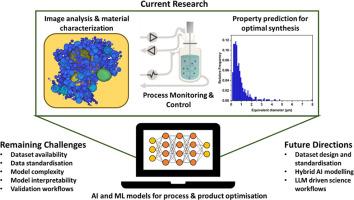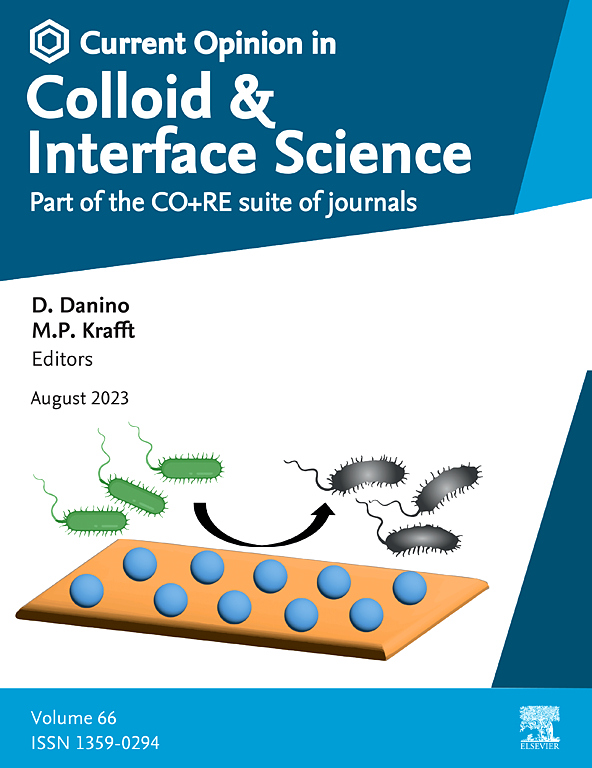Artificial intelligence in colloid and interface science: Current research, challenges and future directions
IF 7
2区 化学
Q1 CHEMISTRY, PHYSICAL
Current Opinion in Colloid & Interface Science
Pub Date : 2025-09-15
DOI:10.1016/j.cocis.2025.101965
引用次数: 0
Abstract
Artificial intelligence (AI) and Machine learning (ML) are transforming colloid and interface science by enabling predictive modelling, autonomous experimentation, and accelerated material design. This review highlights recent advances organised in four topics: (1) prediction of basic physical properties; (2) image analysis; (3) process design, monitoring and optimisation; and (4) morphology and phase behaviour prediction. AI models have improved the prediction accuracy of interfacial tension, critical micelle concentration, foam stability, and complex structure–function relationships, in particular, integrated generative AI approaches support the design of new surfactants and emulsifiers. Image analysis has automated microstructural characterisation and enabled real-time quality control, while AI-enhanced process design has delivered digital twins, closed-loop optimisation, and sustainability-oriented workflows. Morphology and phase behaviour prediction has combined simulation-driven neural networks with generative approaches to accelerate material discovery. The future of AI applications in colloids will be shaped by experimental database design and standardisation, hybrid AI methods integrating physics and surrogate modelling, and AI agents leveraging large language models for literature mining, data curation, and experimental optimisation. Together, these developments promise to establish data-rich, physics informed, and increasingly autonomous research ecosystems for colloids and interface science, accelerating material understanding and design.

胶体和界面科学中的人工智能:研究现状、挑战和未来方向
人工智能(AI)和机器学习(ML)通过实现预测建模、自主实验和加速材料设计,正在改变胶体和界面科学。本文综述了以下四个方面的最新进展:(1)基本物理性质的预测;(2)图像分析;(3)工艺设计、监控和优化;(4)形态与相行为预测。人工智能模型提高了界面张力、临界胶束浓度、泡沫稳定性和复杂结构-功能关系的预测精度,特别是集成的生成式人工智能方法支持了新型表面活性剂和乳化剂的设计。图像分析实现了微结构特征的自动化,并实现了实时质量控制,而人工智能增强的工艺设计提供了数字孪生、闭环优化和面向可持续性的工作流程。形态和相行为预测将模拟驱动的神经网络与生成方法相结合,以加速材料的发现。人工智能在胶体中的未来应用将由实验数据库设计和标准化、集成物理和代理建模的混合人工智能方法,以及利用大型语言模型进行文献挖掘、数据管理和实验优化的人工智能代理来塑造。总之,这些发展有望为胶体和界面科学建立数据丰富、物理信息丰富、越来越自主的研究生态系统,加速材料的理解和设计。
本文章由计算机程序翻译,如有差异,请以英文原文为准。
求助全文
约1分钟内获得全文
求助全文
来源期刊
CiteScore
16.50
自引率
1.10%
发文量
74
审稿时长
11.3 weeks
期刊介绍:
Current Opinion in Colloid and Interface Science (COCIS) is an international journal that focuses on the molecular and nanoscopic aspects of colloidal systems and interfaces in various scientific and technological fields. These include materials science, biologically-relevant systems, energy and environmental technologies, and industrial applications.
Unlike primary journals, COCIS primarily serves as a guide for researchers, helping them navigate through the vast landscape of recently published literature. It critically analyzes the state of the art, identifies bottlenecks and unsolved issues, and proposes future developments.
Moreover, COCIS emphasizes certain areas and papers that are considered particularly interesting and significant by the Editors and Section Editors. Its goal is to provide valuable insights and updates to the research community in these specialized areas.

 求助内容:
求助内容: 应助结果提醒方式:
应助结果提醒方式:


